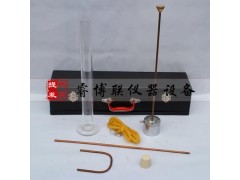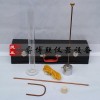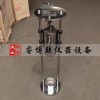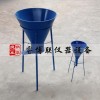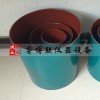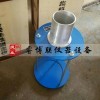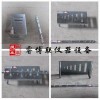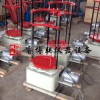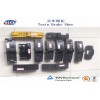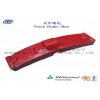mso-hansi-font-family:"Times New Roman"">一、概述:
SD-1手动砂当量试验仪是严格按照JTJ058-2000公路规程设计的产品。在使用本仪器前务必请按如下内容检查是否包装完好、项目齐全。如有欠缺,为维护您的权益请立即告知我们,本厂会及时为您提供服务。
mso-hansi-font-family:"Times New Roman"">二、手动砂当量试验仪产品技术参数:
mso-hansi-font-family:"Times New Roman"">配重活塞:1KG "Times New Roman"">±5g
mso-hansi-font-family:"Times New Roman"">塑料试筒:内径32mm "Times New Roman"">±0.25mm 高度420mm
mso-hansi-font-family:"Times New Roman"">冲洗管:内外6mm "Times New Roman"">±0.5mm 内径4mm mso-hansi-font-family:"Times New Roman"">±0.2mm
mso-hansi-font-family:"Times New Roman"">三、手动砂当量试验仪附件箱清单:
1、试筒 1 "Times New Roman"">套
2、配夹橡胶 1 "Times New Roman"">只
3、试剂 2 "Times New Roman"">瓶
4、冲洗管 1 "Times New Roman"">支
5、配重活塞 1 "Times New Roman"">套
6、虹吸管 1 "Times New Roman"">支
7、说明书 1 "Times New Roman"">本
8、合格证 1 "Times New Roman"">份
mso-hansi-font-family:"Times New Roman"">四、手动砂当量试验仪高浓度氯化钙溶液的配制:
mso-hansi-font-family:"Times New Roman"">按无水氯化钙(g) "Times New Roman"">;蒸流水体积(ml)=1:2 "Times New Roman"">进行配制。氯化钙溶于水时放热,溶液温度升高,待溶液冷却到室温后用滤纸进行过滤,以除去不溶杂质。过滤后的高浓度溶液存放备用,该溶液中氯化钙含量410g/L mso-hansi-font-family:"Times New Roman"">。
1、浓溶液(1L) mso-hansi-font-family:"Times New Roman"">的配制
mso-hansi-font-family:"Times New Roman"">(1 "Times New Roman"">)用量筒量取272ml "Times New Roman"">高浓度氯化钙溶液;
mso-hansi-font-family:"Times New Roman"">(2) "Times New Roman"">用天平称取484.8g "Times New Roman"">丙三醇;
mso-hansi-font-family:"Times New Roman"">(3 "Times New Roman"">)用天平称取13.6g "Times New Roman"">甲醛;
mso-hansi-font-family:"Times New Roman"">(4 "Times New Roman"">)将上述三种试剂转入1L "Times New Roman"">量筒中。转入时要用少量蒸馏水,分别对盛
mso-hansi-font-family:"Times New Roman"">(5 "Times New Roman"">)将1L配毕的溶液倒入2L mso-hansi-font-family:"Times New Roman"">的烧杯或量筒中,混合均匀,装入。
2、制备冲洗液
mso-hansi-font-family:"Times New Roman"">取试验用的浓溶液62.5ml "Times New Roman"">±0.5ml,装入5L mso-hansi-font-family:"Times New Roman"">塑料筒或瓶中,用蒸馏水稀释至2.5 "Times New Roman"">±0.005L "Times New Roman"">。
mso-hansi-font-family:"Times New Roman"">五、手动砂当量试验仪试验方法:
1、目的与适用范围
mso-hansi-font-family:"Times New Roman"">(1 "Times New Roman"">)本方法适用于测定细集料中所含粘性土或杂志的含量,以评定集料的洁净程度,用SE mso-hansi-font-family:"Times New Roman"">表示。
mso-hansi-font-family:"Times New Roman"">(2 "Times New Roman"">)本方法适用于沥青混合料及水泥混凝土用天然砂、人工砂、石屑,其集料最大粒径不得超过4.75mm mso-hansi-font-family:"Times New Roman"">(圆孔筛5mm "Times New Roman"">)
2、仪器与试件
mso-hansi-font-family:"Times New Roman"">本试验需要下列仪器和设备
mso-hansi-font-family:"Times New Roman"">(1 "Times New Roman"">)圆柱形试筒:透明塑料制内径32 "Times New Roman"">±0.025mm, "Times New Roman"">高度420±0.25mm mso-hansi-font-family:"Times New Roman"">。试筒底部起到100 "Times New Roman"">±0.25mm "Times New Roman"">、380±0.25mm mso-hansi-font-family:"Times New Roman"">处刻划标记线,配有橡胶塞。
mso-hansi-font-family:"Times New Roman"">(2 "Times New Roman"">)冲洗管:由一根硬管组成,不锈钢或冷锻铜制其外径为6 "Times New Roman"">±0.5mm,内径为4 mso-hansi-font-family:"Times New Roman"">±0.2mm, "Times New Roman"">管的下部有一个不锈钢两侧 带孔尖头,孔径为1 mso-hansi-font-family:"Times New Roman"">±0.1mm "Times New Roman"">。
mso-hansi-font-family:"Times New Roman"">(3 "Times New Roman"">)塑料筒(5升):桶口配有插虹弯管的橡胶塞。桶底面高出工作台约1.5m
mso-hansi-font-family:"Times New Roman"">(4 "Times New Roman"">)虹吸弯管和进气弯管:将其插入桶口橡胶塞。
mso-hansi-font-family:"Times New Roman"">(5 "Times New Roman"">)橡胶管(或塑料管):长约1.5m "Times New Roman"">,内径约5mm "Times New Roman"">,与冲洗管、虹吸弯管联在一起吸液用,配有金属夹,以控制冲洗液流量。
mso-hansi-font-family:"Times New Roman"">(6 "Times New Roman"">)配重活塞由杆、底座、套筒、配重组成。杆长430 "Times New Roman"">±0.25mm "Times New Roman"">;底座直径25 "Times New Roman"">±0.1mm,底面平坦光滑,垂直杆轴,横向有三个螺丝可保持活塞在试筒中间有一点小缝隙。套筒有一个螺丝,能固定活塞下沉的位置,并有一个能靠尺子的深1cm mso-hansi-font-family:"Times New Roman"">、宽5mm "Times New Roman"">的缺口,用于测量读数。固定在活塞杆顶端的配重,除筒套外总重1kg "Times New Roman"">±5g.
mso-hansi-font-family:"Times New Roman"">(7 "Times New Roman"">)手动振荡:使试筒产生横向直线往复运动。振幅:20.3 "Times New Roman"">±1.0cm,运动周期180 mso-hansi-font-family:"Times New Roman"">±2 "Times New Roman"">次/min
mso-hansi-font-family:"Times New Roman"">(8 "Times New Roman"">)天平:称量1kg. mso-hansi-font-family:"Times New Roman"">感量1g
mso-hansi-font-family:"Times New Roman"">(9 "Times New Roman"">)烘箱:能使温度控制在105 "Times New Roman"">±5℃
mso-hansi-font-family:"Times New Roman"">(10 "Times New Roman"">)广口漏斗(塑料制):口的直径100mm "Times New Roman"">左右
mso-hansi-font-family:"Times New Roman"">(11 "Times New Roman"">)一把长500mm "Times New Roman"">的钢板尺,刻度精确到1mm
mso-hansi-font-family:"Times New Roman"">(12) "Times New Roman"">一个筛孔4.75mm "Times New Roman"">(圆孔为5mm) "Times New Roman"">和筛底。
mso-hansi-font-family:"Times New Roman"">(13 "Times New Roman"">)一个刮刀和一把勺子。
mso-hansi-font-family:"Times New Roman"">(14 "Times New Roman"">)温度计。
mso-hansi-font-family:"Times New Roman"">(15 "Times New Roman"">)其他:一升量筒、2 "Times New Roman"">个烧杯、刷子、盘子、小铝盒等
3、试验步骤:
mso-hansi-font-family:"Times New Roman"">为了不影响沉淀的过程,试验必须在无抖动的水平台上进行,随时检查试验的冲洗管口,防止堵塞。
mso-hansi-font-family:"Times New Roman"">试验过程中,冲洗液的温度应保持20 mso-hansi-font-family:"Times New Roman"">±2 "Times New Roman"">℃范围内。
mso-hansi-font-family:"Times New Roman"">由于塑料在太阳光下容易变成不透明,应尽量避免将塑料器皿直径暴露在太阳光下。盛试验溶液的塑料器皿用完后要清洗干净。
mso-hansi-font-family:"Times New Roman"">(1 "Times New Roman"">)用冲洗管将冲洗液吸入试筒直到100mm "Times New Roman"">刻度---(约需80ml mso-hansi-font-family:"Times New Roman"">)。
mso-hansi-font-family:"Times New Roman"">(2 "Times New Roman"">)把相当于120 "Times New Roman"">±1g干料重的试样用漏斗仔细地倒入竖立的试筒中。
mso-hansi-font-family:"Times New Roman"">(3 "Times New Roman"">)用手掌反复敲打筒下部,以除去气泡,使试样尽快润湿,然后静置10min.
mso-hansi-font-family:"Times New Roman"">(4 "Times New Roman"">)在试样静置10 "Times New Roman"">±1min结束后,用橡胶塞堵住试筒。
mso-hansi-font-family:"Times New Roman"">(5 "Times New Roman"">)手动振荡:使试筒产生横向直线往复运动。振幅;20.3 "Times New Roman"">±1.0cm,运动周期180 mso-hansi-font-family:"Times New Roman"">±2 "Times New Roman"">次/min.振荡拧下橡胶完成塞。
mso-hansi-font-family:"Times New Roman"">(6 "Times New Roman"">)将冲洗管插入试筒中,用冲洗液迅速冲洗附在试筒壁上的集料然后将冲洗管插到试筒底部,慢慢转动冲洗管,同时匀速缓缓提高冲洗管,使附着在集料表面的细粒杂质浮上来,直到溶液达到380mm mso-hansi-font-family:"Times New Roman"">刻度线为止。
mso-hansi-font-family:"Times New Roman"">(7 "Times New Roman"">)缓慢匀速向上拔出冲洗管,当液面位于380mm "Times New Roman"">刻度是,切断冲洗管的液流,使液面保持380mm "Times New Roman"">刻度线,在没有扰动的情况下静置20min "Times New Roman"">±15S。
mso-hansi-font-family:"Times New Roman"">测量:
mso-hansi-font-family:"Times New Roman"">(1 "Times New Roman"">)静置20分钟后,用钢板尺在试筒外测量从试筒底部到絮凝物上液面的高度,即h1 mso-hansi-font-family:"Times New Roman"">(如有可能,同时测得从试筒底部到沉淀物上液面的高度,即h2, mso-hansi-font-family:"Times New Roman"">此项作为与活塞测量的砂当量值的参考值),准确到1mm mso-hansi-font-family:"Times New Roman"">。
mso-hansi-font-family:"Times New Roman"">(2 "Times New Roman"">)将配重活塞套筒在试筒口放好,使配重活塞徐徐落入试筒,直至碰到沉淀物时,立即拧紧固定螺丝,将尺子插入套筒的开口处,使零点对准的底面。从套筒处读取沉淀物高度,即h2, mso-hansi-font-family:"Times New Roman"">准确至1mm "Times New Roman"">。上述测量过程应在30 "Times New Roman"">秒内完成。同时记录试筒内的温度,准确至1 "Times New Roman"">℃。
mso-hansi-font-family:"Times New Roman"">以上步骤进行二个试样的平行试验。
4、结果与计算:
4.1试样用活塞测定砂当量值按JTJ058-2000公路规程式(5.1 mso-hansi-font-family:"Times New Roman"">)计算:
SE=(h2/h1) mso-hansi-font-family:"Times New Roman"">×100%
mso-hansi-font-family:"Times New Roman"">式中:SE "Times New Roman"">为试样的砂当量,%
h1为试筒中絮凝物和沉淀物的总高度,mm
h2为试筒中用活塞测定沉淀物的高度,mm
4.2试样的目测砂当量值按JTJ058-2000公路规程式(5.2 mso-hansi-font-family:"Times New Roman"">)计算:
SEV=(h2/h1)×100%
mso-hansi-font-family:"Times New Roman"">式中:SEV "Times New Roman"">为试样的目测砂当量值:
h1为试筒中絮凝物和沉淀物的总高度,mm
h2为试筒中用目测测定沉淀物的高度,mm
4.3一种集料应平行测定两次,集料的砂当量SE mso-hansi-font-family:"Times New Roman"">或SEV "Times New Roman"">是二个试样平行测定的砂当量平均值,以活塞测量为准,并以整数表示。

